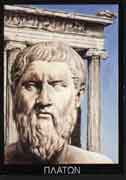.
 |
| Part of the series on: The Dialogues of Plato |
| Early dialogues: |
| Apology – Charmides – Crito |
| Euthyphro – First Alcibiades |
| Hippias Major – Hippias Minor |
| Ion – Laches – Lysis |
| Transitional & middle dialogues: |
| Cratylus – Euthydemus – Gorgias |
| Menexenus – Meno – Phaedo |
| Protagoras – Symposium |
| Later middle dialogues: |
| The Republic – Phaedrus |
| Parmenides – Theaetetus |
| Late dialogues: |
| Timaeus – Critias |
| The Sophist – The Statesman |
| Philebus – Laws |
| Of doubtful authenticity: |
| Clitophon – Epinomis |
| Epistles – Hipparchus |
| Minos – Rival Lovers |
| Second Alcibiades – Theages |
Cratylus (Κρατυλος) is the name of a dialogue by Plato, written in approximately 360 BC. In the dialogue, Socrates is asked by two men, Cratylus and Hermogenes, to tell them whether names are "conventional" or "natural", that is, whether language is a system of arbitrary signs or whether words have an intrinsic relation to the things they signify. In doing this, Cratylus became one of the earliest philosophical texts of the Classical Greek period to deal with matters of etymology and linguistics.
When discussing how a word would relate to its subject, he compares the original creation of a word to the work of an artist. An artist uses color to express the essence of his subject in a painting. In much the same way, the creator of words uses letters containing certain sounds to express the essence of a word's subject. There is a letter that is best for soft things, one for liquid things, and so on. He comments, "This would be the most perfect state of language."
The countering position is that names have come about due to custom and convention. They do not express the essence of their subject, and so they can be swapped with something unrelated if those who use the word were to agree upon it.
The line between the two perspectives is often blurred. During more than half of the dialogue, Socrates makes guesses at Hermogenes' request as to where names and words have come from. These include the names of the Olympian gods, personified deities, and many words that describe abstract concepts. Many of the words which Socrates uses as examples may have come from an idea originally linked to the name, but have changed over time. Those of which he cannot find a link, he often assumes have come from foreign origins or have changed so much as to lose all resemblance to the original word. He states, "names have been so twisted in all manner of ways, that I should not be surprised if the old language when compared with that of now in use would appear to us to be a barbarous tongue
| Ancient Greece
Science, Technology , Medicine , Warfare, , Biographies , Life , Cities/Places/Maps , Arts , Literature , Philosophy ,Olympics, Mythology , History , Images Medieval Greece / Byzantine Empire Science, Technology, Arts, , Warfare , Literature, Biographies, Icons, History Modern Greece Cities, Islands, Regions, Fauna/Flora ,Biographies , History , Warfare, Science/Technology, Literature, Music , Arts , Film/Actors , Sport , Fashion --- |
From Wikipedia, All text is available under the terms of the GNU Free Documentation License

